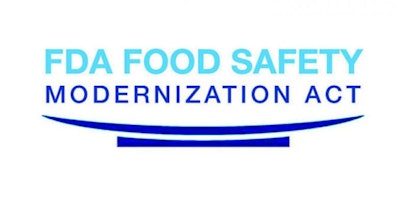
 Anne Cooper
Anne Cooper Kyra Douglas
Kyra DouglasThe food industry is buzzing about the Food Safety Modernization Act (FSMA). FSMA is the most sweeping reform of our food safety laws in more than 70 years, and was signed into law by President Barack Obama on January 4, 2011. It aims to ensure the United States food supply is safe by shifting the focus from responding to contamination to preventing it.
Congress passed FSMA to control chemical and physical hazards that can cause foodborne illness. The legislation’s vast new requirements for the food industry have only limited applicability to the packaging industry, a fact not yet well-understood throughout the supply chain. This article will help you determine how FSMA may or may not apply to your company, and why.
Required FSMA implementation dates vary depending on the size of a company and the specific rule affecting the product being produced. If a facility or farm is required to register with the FDA under the Public Health Security and Bioterrorism Preparedness and Response Act of 2002 (Bioterrorism Act), then they are likely to be impacted by one of the FSMA rules, unless they are in an industry sector subject to an exemption.
There are seven FSMA Food Rules (laws):
- Preventive Controls for Human Food: covers food for human consumption (21 CFR Parts 1, 16, 22, 106, 114, 117, 120, 129, 179 and 211)
- Preventive Controls for Animal Food: covers food for pets and other animals (21 CFR Parts 11, 16, 117, 500, 507, and 509)
- Standards for the Growing, Harvesting, Packing and Holding of Produce for Human Consumption: covers most types of produce that are ready to eat without processing (21 CFR Parts 11, 16, 112)
- Foreign Supplier Verification Program for Importers of Food for Human and Animals: addresses importers and foreign suppliers of food and substances being directly added to food imported to the U.S. (21 CFR Parts 1, 11, 111).
- Mitigation Strategies to Protect Food Against Intentional Adulteration: focuses on food defense and protection from intentional adulteration of food, including tampering, terrorism, and unlawful ingredient substitution for monetary gain (21 CFR Parts 11 and 121)
- Sanitary Transportation of Human and Animal Food: covers the transportation of human and animal food (21 CFR Parts 1 and 11)
- Accreditation of Third Party Certification Bodies to Conduct Food Safety Audits and Issue Certifications: covers the accreditation of third party auditing companies to become approved to conduct FSMA audits on behalf of the FDA (21 CFR Parts 1, 11 and 16)
In order to understand the impact of FSMA on the packaging manufacturing industry, it is important to review some of the regulatory definitions tied to food and food contact surfaces (aka packaging).
- Section 201(f) of the Federal Food, Drug, and Cosmetic Act (21 U.S.C. 321(f)): The term "food" means (1) articles used for food or drink for man or other animals, (2) chewing gum, and (3) articles used for components of any such article.
- Section 201(s) of the Federal Food, Drug, and Cosmetic Act (21 U.S.C 321(s)):The term "food additive" means any substance the intended use of which results or may reasonably be expected to result, directly or indirectly, in its becoming a component or otherwise affecting the characteristics of any food (including any substance intended for use in producing, manufacturing, packing, processing, preparing, treating, packaging, transporting, or holding food…”
- Section 415 of the Bioterrorism Act (21 CFR 1.227(b)(4)), on Registration of Food Facilities: Food has the meaning given in Section 201(f) of the [Federal Food, Drug, and Cosmetic Act] (21 U.S.C. 321(f)), (i) Except for purposes of this subpart, it does not include: (A)Food contact substances as defined in section 409(h)(6) of the act (21 U.S.C. 348(h)(6)), or (B) Pesticides as defined in 7 U.S.C. 136(u).
- Section 409(h)(6) of the Federal Food, Drug, and Cosmetic Act (U.S.C. 348(h)(6)): In this section, the term ‘‘food contact substance (FCS) ’’ means any substance intended for use as a component of materials used in manufacturing, packing, packaging, transporting, or holding food if such use is not intended to have any technical effect in such food.”
Manufacturers of food packaging components are excluded from most of FDA’s rules to implement FSMA, unless they are required to register as a food facility under Section 415 of the Bioterrorism Act (21 CFR 1.227(b)(4)). An example is a manufacturer of quick service utensils that are packaged in the facility with salt and pepper. Another is a manufacturer of food contact substances that are intended to have a technical effect in food. In both cases, the manufacturer is handling substances that meet the definition of “food” in Section 201(f) or “food additive” in Section 201(s) but not the definition of “food contact substances” in Section 409(h)(6) of the Federal Food, Drug, and Cosmetic Act.
All manufacturers of food contact substances are covered by the records access, administrative detention and recall authority provisions of FSMA in the unlikely event that they would be the cause of a serious food safety event. Section 101 of FSMA authorizes FDA to access records for products related to a food, such as packaging, if there is reasonable probability that the food will cause serious adverse health consequences or death. Section 206 grants FDA mandatory recall authority based on the same standard of harm, and Section 207 empowers FDA to detain any food believed to be adulterated or misbranded. Throughout implementation of FSMA, FDA has repeatedly acknowledged the low risk posed by food contact materials, but the agency maintains the authority to act as necessary if a serious food safety threat were linked to these products.
Until recently, it was unclear how the packaging industry would be affected by FSMA’s provisions related to sanitary transportation and Foreign Supplier Verification Programs (FSVP). Then, in April 2016, FDA published its Final FSMA Rule on Sanitary Transportation of Human and Animal Food and explicitly exempted food contact substances from the scope due to the low risk of microbial contamination. In August 2016, FDA published its Final Rule on The Food and Drug Administration Food Safety Modernization Act; Extension and Clarification of Compliance Dates for Certain Provisions of Four Implementing Rules, which extended the compliance deadline for importers of food contact substances under the FSVP Rule until May 28, 2019 in order to consider how the rule should apply to them. On January 4, 2018, FDA published guidance and announced its intent to exercise enforcement discretion for importers of food contact substances under the FSVP rule, citing the effectiveness of FDA’s existing regulatory program and low consumer exposure to food contact substances. This announcement effectively eliminates the need for importers of food contact substances to comply with the FSVP regulation. Furthermore, in this guidance FDA states that “…FDA has determined that there are no hazards associated with food contact substances that are hazards requiring a supply-chain applied control under 21 CFR 117.405(a)(1).”
FDA and many counterpart agencies worldwide maintain robust regulatory standards to ensure the safety of food contact substances. Even in countries that do not have well-developed regulatory programs or technical capacity, a general safety standard usually applies, to which compliance may be demonstrated by clearance of a material in another jurisdiction, usually the U.S., EU or Japan. With stringent regulations already in force to control hazards that could result from physical contamination or chemical migration from packaging to food, and in view of the low risk for packaging to introduce microbiological contamination into the food supply, it is not hard to see why most FSMA provisions need not apply to the food packaging supply chain.
Anne Cooper is Food Technical Manager for EAGLE Certification Group. Kyra Douglas is Senior Director, Global Regulatory Affairs for the Plastics Industry Association.























